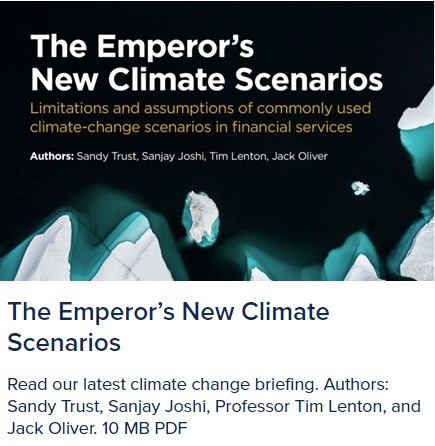IFoA report: The Emperors new climate scenarios
Posted on: July 10th, 2023

The Institute and Faculty of Actuaries has issued a report warning that climate risk is not being taken sufficiently seriously in financial services thanks to economic modelling that pays insufficient attention to climate science.
This new report – produced with Exeter University – paints a picture of economic models seriously underestimating climate risk – in particular ‘tipping points’ – with the result that investors, policy makers and others may be basing their decisions on inadequate information.
The media release text is introduced below:
Emperor’s New Climate Scenarios – a warning for financial services
4 July 2023
Scenario modelling is an important component of the actuarial risk-management toolkit. In the context of climate change, scenario modelling enables financial institutions and regulators to investigate the impact of different climate futures, which is important given the challenges we face.
The IFoA has partnered with the University of Exeter to produce this paper demonstrating how a deeper understanding of climate change, including tipping points can improve financial services climate- scenario modelling.
In the paper we use actuarial principles to examine the limitations and assumptions in relation to climate-change scenario modelling practices in financial services, focusing on hot-house world scenarios of 3˚C or more of warming. It demonstrates how current techniques exclude many of the most severe impacts we can expect from climate change, such as tipping points and second order impacts – they simply do not exist in the models meaning the models understate the level of risk.
Our objective in writing this paper is to help accelerate the progress of more realistic scenario modelling, which we in turn hope will help to further accelerate the progress on decarbonisation we need.
Key findings:
- Many climate-scenario models in financial services are significantly underestimating climate risk
- Carbon budgets may be smaller than anticipated and risks may develop more quickly
- Regulatory scenarios introduce consistency but also the risk of group think, with scenario analysis outcomes being taken too literally and out of context
- Education is needed on the assumptions underpinning the models and their limitations
- The development of realistic qualitative and quantitative climate scenarios is required
- Model development is required to better capture risk drivers, uncertainties and impacts
Report links:
IFoA/University of Exeter paper https://actuaries.org.uk/emperors-new-climate-scenarios
Carbon Tracker report – by Professor Steve Keen (focused on pensions):
- Loading the Dice report: https://carbontracker.org/reports/loading-the-dice-against-pensions/
- Press Release: here
- Blog: https://carbontracker.org/the-climate-risk-delusion-under-pricing-climate-risk-contributes-to-climate-change-itself-and-puts-global-pension-wealth-in-peril/
USS 2023 TCFD Report (which refers to decision useful climate scenarios) https://www.uss.co.uk/news-and-views/views-from-uss/2023/07/07252023_our-latest-progress-to-net-zero. (See pages 19/20)
EEIST / Mike Clark (co-author) report: “Net-zero transition planning for pension funds and other asset owners: Applying EEIST’s risk and opportunity analysis.” Commissioned by UK Government Department for Energy Security and Net Zero (DESNZ – previously BEIS), funders (with CIFF) of EEIST.
Commentary:
Henry Tapper – AgeWage opinion piece
Julia Dreblow – ILP Moneyfacts Actuaries vs Econs article